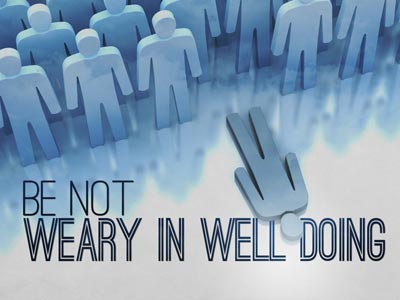-
Integrating God In All Life Series
Contributed by Brad Bailey on Nov 28, 2017 (message contributor)
Summary: I want to help us confront a division that is so natural it can influence our lives more than we know… the division between what we perceive as spiritual and secular… between what we deem spiritually relevant and spiritually irrelevant… between what
Integrating God in All of Life
(Intro: A division (dichotomy) that needs to die)
Let me begin this morning by presenting a few questions… just to stir our thinking:
• Where are you most likely to be honoring God… here on Sundays… or Monday at work?
• Do you sense any real spiritual significance in your work? … neighborhood? … sleep?
• Is praying more spiritual than playing? Is God involved in one more than the other?
For most of us… those questions may have stretched our perspective a little bit…
> because we have divided up our lives in ways never intended… and more importantly…
ways that aren’t real.
I want to help us confront a division that is so natural it can influence our lives more than we
know… the division between what we perceive as spiritual and secular… between what we
deem spiritually relevant and spiritually irrelevant… between what is part of the “Christian life”
and everything else.
There is a false division of life… even if unclear or unconscious… that can cause us to
compartmentalize and confine our spiritual growth. The result is that…
• We deem full time ministers and missionaries to have the only spiritual vocations.
• Our spiritual lives become less dynamic and daily… and become safely divided…. but
strangely divided.
We sense we are living two lives.
For 166 of the 168 hours in the week we lose our sense of God’s interest and involvement.
> This morning…I want to help us think about all the other aspects and activities of our lives …
about integrating God into all of our life.
Beginning a series entitled “INTEGRATE: Spirituality in Everyday Life.”
Today… start with the underlying foundations and formation of an integrated spiritual life.
We see in this tendency throughout history…
From the start… God called people to special times of dedicated activities… but over time these
activities that were called upon to convene or culminate God’s relationship with His people…
began to capture it… and in the minds of people… their awareness of God was so focused on such
times… that people grew to divide what we would deem the ‘religious’ activities from all others.
Mastered by the religious leaders…. And still today… those called to pastoral leadership, such
as myself, can perpetuate.
It’s a tendency we all have to face.
Most of us develop a relative comfort knowing how to engage in our corporate worship of
God… and the activities that are involved when gathered. But the truth is that we’re often less
clear on how to integrate the commitment to Christ into the rest of our week,,, and all the various
roles and activities.
2
This tendency can certainly ease of lot of tensions… because it’s simpler and safer to focus on the
familiar. If I tend to keep my sense of spiritual life focused on that which I engage in when we
gather…
The challenges and compromises I make in the rest of my life may not be so significant.
I can probably enjoy a lot more confidence that I’m doing well here… than if I were to focus on
how my spiritual life is lived out during the rest of my life… how it might be experienced and
assessed by my wife, kids. Co-workers, and neighbors.
Jesus operated out of an entirely different reality… an undivided reality…. just
life and His Father at work in it.
Perhaps some of the most profound words that capture his life… are those which begin the
descriptions of his various encounters…“As he walked”… As he talked… As they ate…
> His life affirms that God is at work in all areas of life… all aspects and activities.
(Paul) - The significance was captured by one who had become a master of religion… the
apostle Paul. He addresses this in several of his letters to the first churches… in particular in book
of Colossians.
The Church in Colossae faced confusion usually identified as a type of early Gnosticism,
• False teachers taught that God did not create the world because in their view matter was evil
and God cannot create evil.
• Believing that matter was evil, they argued that God would not have come to earth as a human
in bodily form.
• They emphasized asceticism and outward religious rituals.
Col. 1:15-17, 19-20
He (Christ) is the image of the invisible God, the firstborn over all creation. 16For by him all
things were created: things in heaven and on earth, visible and invisible, whether thrones or
powers or rulers or authorities; all things were created by him and for him. 17He is before all
things, and in him all things hold together.
…For God was pleased to have all his fullness dwell in him, 20and through him to reconcile to

 Sermon Central
Sermon Central



